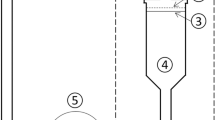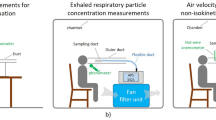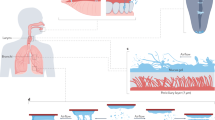Abstract
An apparatus is described which will provide a continuous and regular aerosol of 5µ particles of polystyrene labelled with chromium-51. The elimination of the radioactively labelled particles from the lungs after a single inhalation by human beings is followed by external gamma-ray measurements.
This is a preview of subscription content, access via your institution
Access options
Subscribe to this journal
Receive 51 print issues and online access
$199.00 per year
only $3.90 per issue
Buy this article
- Purchase on Springer Link
- Instant access to full article PDF
Prices may be subject to local taxes which are calculated during checkout
Similar content being viewed by others
References
May, K. R., J. App. Phys., 20, 932 (1949).
Amer. Conf. Govern. Indust. Hygienists, Threshold Limit Values; Amer. Med. Assoc. Arch. Indust. Health, 20, 266 (1959).
Albert, R. E. A., and Arnett, L. C., Arch. Indust. Health, 12, 99 (1955).
Morrow, P. E., Gibb, F. R., and Gazioglu, K., Second Conf. Inhaled Particles and Vapours (Cambridge, 1965).
Fowler, W. S., Lung function Studies II, The Respiratory Dead Space, Amer. J. Physiol., 154, 405 (1948).
Author information
Authors and Affiliations
Rights and permissions
About this article
Cite this article
BOOKER, D., CHAMBERLAIN, A., RUNDO, J. et al. Elimination of 5µ Particles from the Human Lung. Nature 215, 30–33 (1967). https://doi.org/10.1038/215030a0
Received:
Revised:
Issue Date:
DOI: https://doi.org/10.1038/215030a0
This article is cited by
-
Evidence for Temporary Slowing of Mucociliary Clearance in the Lung caused by Tobacco Smoking
Nature (1971)
-
No Demonstrable Long Term Effects of Cigarette Smoking on the Mucociliary Mechanism of the Human Lung
Nature (1970)
-
Attenuation in the Chest Wall of 20 keV X-rays from an Inhaled Radioactive Aerosol
Nature (1968)
-
Electrical Mobility of Sub-micron Particles
Nature (1968)
Comments
By submitting a comment you agree to abide by our Terms and Community Guidelines. If you find something abusive or that does not comply with our terms or guidelines please flag it as inappropriate.



